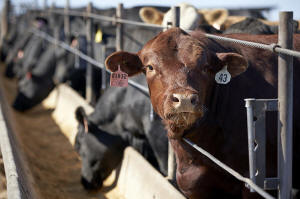Proposal to ban lab-grown meat in Nebraska gets pushback from ranchers
and farm groups
 Send a link to a friend
Send a link to a friend
 [February 21, 2025] By
MARGERY A. BECK [February 21, 2025] By
MARGERY A. BECK
LINCOLN, Neb. (AP) — The prospect of banning the sale of so-called
lab-grown meat might seem like a no-brainer in Nebraska, where beef is
king, but some of the proposal's staunchest opposition has come from
ranchers and farming groups who say they can compete without the
government’s help.
Nebraska Gov. Jim Pillen — one of the largest pork producers in the
country — is behind the push to ban cultivated meat, saying he wants to
protect ranchers and meat producers. The Republican governor signed an
executive order last August to keep state agencies and contractors from
procuring lab-created meat, even though it could be years before such
products are on store shelves.
A number of ranchers and meat industry groups are pushing back on the
governor's plan.
Dan Morgan is a fourth-generation cattle rancher from central Nebraska
who supplies high-end beef to all 50 states and six countries. He
welcomes companies seeking to produce lab-grown meat to “jump into the
pool” and try to compete with his Waygu beef. Stifling competition in a
free market should be anathema in a Republican-dominated state like
Nebraska, he said.
“It sounds like a bunch of right-wing Republicans echoing a bunch of
left-wing Democrats,” he said, adding that the government should be
limited to regulating the new product's labels and inspecting its
facilities to ensure food safety.

“After that, it's up to the consumer to make the decision about what
they buy and eat.”
Nebraska is among about a dozen states that have introduced measures to
ban the manufacture, sale or distribution of lab-grown products,
according to . Two states — Florida and Alabama — have already enacted
such bans.
The target of the bills is “cell-cultivated” or “cell-cultured” meat,
which is grown from the cells of animals in bioreactor steel tanks. The
cells are bathed for weeks in nutrients, prompting them to grow and
divide, turning them into skeletal muscle, fat and connective tissues.
The push to ban cultivated meat comes well before the innovation could
be considered an industry. While more than two dozen companies are
working to develop such meat products, only two — Upside Foods and Good
Meat, both based in California — have been approved by the federal
government to sell cultivated chicken in the U.S. Even then, none of the
companies are close to mass producing and selling the products on store
shelves.
In recent weeks, supporters of the Nebraska bill have shifted their
arguments from industry protection to questions of safety surrounding
cell-cultured meat. That includes its sponsor, state Sen. Barry DeKay, a
Nebraska rancher, and Sherry Vinton, the director of the Nebraska
Department of Agriculture. Both testified in support of the bill at a
committee hearing earlier this week, calling cultured meat “synthetic
food” and voicing concern about possible health implications from eating
it.
[to top of second column] |

Cattle eat at a feedlot in Columbus, Nebraska, June 10, 2020. (AP
Photo/Nati Harnik, File)
 But it's been no secret that the
push for a ban is rooted in shielding Nebraska's traditional meat
industry. Nebraska tops all other states for beef production and
beef exports, according to the Nebraska Department of Agriculture.
Pillen named the ban among his top priorities during his State of
the State address last month.
“The backers of these products are cut from the same cloth as the
anti-farmer activists who want to put our agriculture producers out
of business, and we need to recognize them as such,” he said.
The Association for Meat, Poultry and Seafood Innovation, the
lobbying group for the emerging cultured meat industry, disputes
Pillen's insistence that it's a threat to the traditional meat
industry, noting studies that show global demand for meat-based
protein will double by 2050.
“We’re really a complementary component here,” said Suzi Gerber,
executive director of the association. “So it’s a little bit
mystifying to me why any individual stakeholder would see this as a
threat.”
Several farm organizations, including Nebraska Farm Bureau, Nebraska
Cattlemen and the Nebraska Pork Producers, agree they're not worried
about competition from the emerging industry. Those groups prefer a
sister bill that would only require they be clearly labeled as
lab-grown products to separate them from traditional meat. More than
a dozen states have also issued similar labeling bills, and some —
like Colorado — have seen ban efforts abandoned in favor of labeling
measures.
Paul Sherman is an attorney with the Institute for Justice, which is
representing Upside Foods in its lawsuit challenging the Florida
ban. He said it's no surprise most of the proposed bans are being
pushed by those with connections to traditional agriculture.
“I think it certainly shows that the purpose of these laws isn’t
about protecting public health and safety,” he said. “It’s about
protecting traditional agriculture from economic competition. And
that is not a legitimate use of government power.”
All contents © copyright 2025 Associated Press. All rights reserved
 |